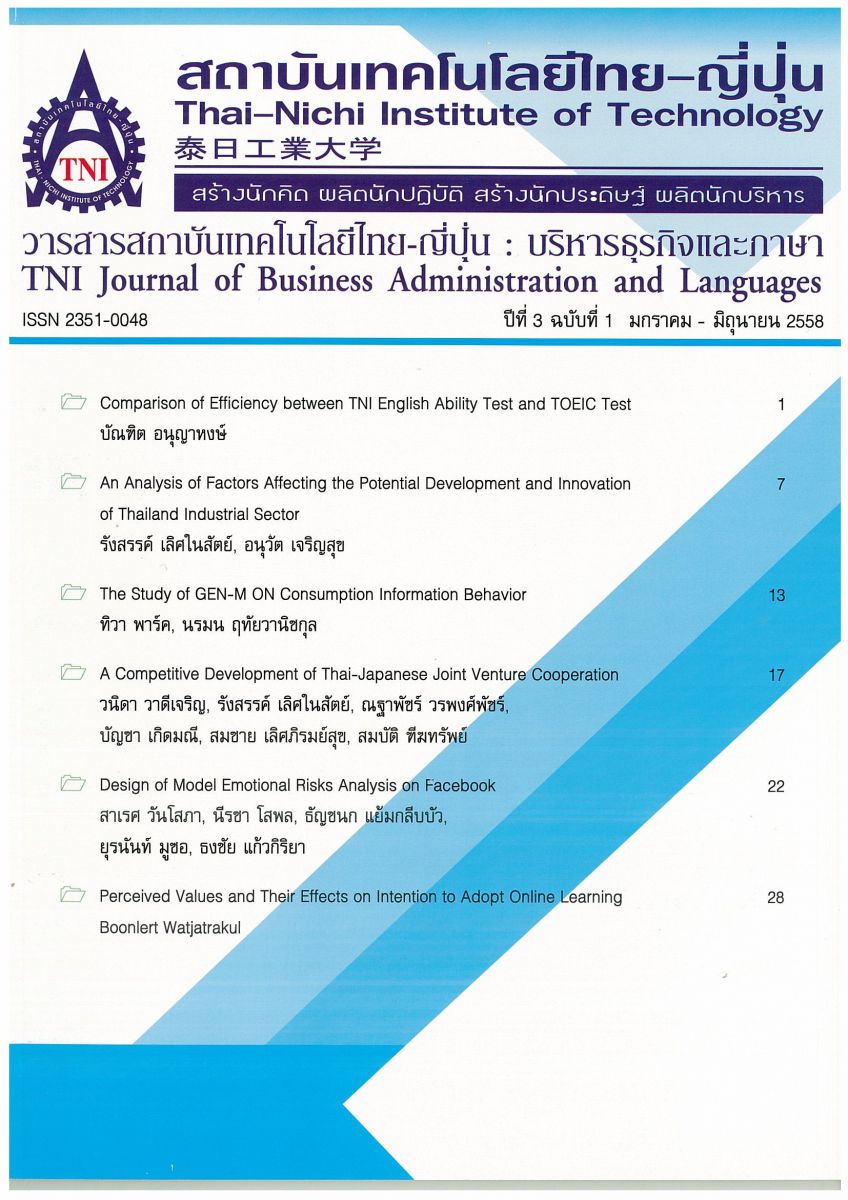การวิเคราะห์ปัจจัยที่ส่งผลต่อการพัฒนาศักยภาพและนวัตกรรมของภาคธุรกิจอุตสาหกรรมไทย
Main Article Content
บทคัดย่อ
วัตถุประสงค์ของการวิจัยครั้งนี้คือ เพื่อศึกษาการวิเคราะห์ปัจจัยที่ส่งผลต่อการพัฒนาศักยภาพและนวัตกรรมของภาคธุรกิจอุตสาหกรรมไทยกลุ่มที่ใช้ในการศึกษาครั้งนี้ ได้แก่ กลุ่มอุตสาหกรรมเป้าหมาย ได้แก่ กลุ่มอุตสาหกรรมยานยนต์ กลุ่มอุตสาหกรรมเครื่องไฟฟ้าและอิเล็กทรอนิกส์กลุ่มอุตสาหกรรมสิ่งทอและเครื่องนุ่งห่มและกลุ่มอุตสาหกรรมอาหารผู้วิจัยกำหนดวิธีการศึกษาการสุ่มตัวอย่างจากประชากรโดใช้วิธีการสุ่มตัวอย่างอย่างมีระบบ (Systematic Random Sampling) และได้ตำนวนกลุ่มตัวอย่างจำนวน 370 บริษัท เครื่องมือที่ใช้ในการเก็บรวบรวมข้อมูลเป็นแบบสอบถามมาตราส่วนประมาณค่า 5 ระดับ วิเคราะห์ข้อมูลทั่วไปของกลุ่มตัวย่างโดยใช้ค่าสถิติ ได้แก่ ร้อยละ ค่าเฉลี่ย ค่าเบี่ยงเบนมาตรฐาน การวิเคราะห์องค์ประกอบด้วยโปรแกรมสำเร็จรูปสำหรับการวิเคราะห์ข้อมูลทางสถิติ จากผลการศึกษารายด้านพบว่า ปัจจัยที่ส่งผลต่อการพัฒนาศัยภาพและนวัตกรรมของภาคธุรกิจอุตสาหกรรมไทย จำแนกรายด้าน พบว่า ด้านที่ส่งผลมากที่สุด คือ ด้านการพัฒนากระบวนการผลิต รองลงมาคือ ด้านการตลาดโดยที่ปัจจัยทุกด้านส่งผลอยู่ในระดับมาก เมื่อพิจารณาเป็นรายข้อ ทั้งหมดพบว่าส่งผลอยู่ระดับมากทุกปัจจัยจากการวิเคราะห์องค์ประกอบพบว่าองค์ประกอบที่ส่งผลต่อการพัฒนาศักยภาพและนวัตกรรมของภาคธุรกิจอุตสาหกรรมไทย ภาพรวม มีทั้งหมด 7 องค์ประกอบ ประกอบด้วย
องค์ประกกอบที่ 1 ด้านการพัฒนากระบวนการผลิตสินค้ามี 11 ตัวแปร
องค์ประกอบที่ 2 ด้านนโยบายการสนับสนุนของบริษัทมี 11 ตัวแปร
องค์ประกอบที่ 3 ด้านนโยบายการสนับสนุนจากภาครัฐมี 8 ตัวแปร
องค์ประกอบที่ 4 ด้านการฝึกอบรมพัฒนาทักษะบุคลากรมี 11 ตัวแปร
องค์ประกอบที่ 5 ด้านการถ่ายทอดเทคโนโลยีมี 6 ตัวแปร
องค์ประกอบที่ 6 ด้านคุณภาพของวัตถุดิบมี 5 ตัวแปร และ
องค์ประกอบที่ 7 ด้านความต้องการพัฒนาสินค้า มี 4 ตัวแปร
การดำเนินงานเพื่อที่จะพัฒนาศักยภาพและนวัตกรรมของภาคธุรกิจอุตสาหกรรมไทย ต้องพิจารณาดำเนินการทั้งระบบโดยปัจจัยหลักคือ การพัฒนากระบวนการผลิตซึ่งจะต้องได้รับการสนับสนุนจากภายในก่อน คือ การมีนโยบายสนับสนุนจากบริษัท และการสนับสนุนจากภายนอกคือ นโยบายจากภาครัฐ ทั้งนี้เพื่อที่บริษัทจะสามารถขับเคลื่อนเพื่อพัฒนาศักยภาพและนวัตกรรมได้อย่างต่อเนื่อง
Article Details
นโยบายการรับบทความ
กองบรรณาธิการวารสารสถาบันเทคโนโลยีไทย-ญี่ปุ่น มีความยินดีรับบทความจากอาจารย์ นักศึกษา และผู้ทรงคุณวุฒิในสาขาบริหารธุรกิจและภาษา ที่เขียนเป็นภาษาไทยหรือภาษาอังกฤษ ซึ่งผลงานวิชาการที่ส่งมาขอตีพิมพ์ต้องไม่เคยเผยแพร่ในสิ่งพิมพ์อื่นใดมาก่อน และต้องไม่อยู่ในระหว่างการพิจารณาของวารสารอื่นที่นำส่ง ดังนั้นผู้สนใจที่จะร่วมเผยแพร่ผลงานและความรู้ที่ศึกษามาสามารถนำส่งบทความได้ที่กองบรรณาธิการเพื่อเสนอต่อคณะกรรมการกลั่นกรองบทความพิจารณาจัดพิมพ์ในวารสารต่อไป ทั้งนี้บทความที่สามารถเผยแพร่ได้ประกอบด้วยบทความวิจัย ผู้สนใจสามารถศึกษาและจัดเตรียมบทความจากคำแนะนำสำหรับผู้เขียนบทความ
การละเมิดลิขสิทธิ์ถือเป็นความรับผิดชอบของผู้ส่งบทความโดยตรง บทความที่ได้รับการตีพิมพ์ต้องผ่านการพิจารณากลั่นกรองคุณภาพจากผู้ทรงคุณวุฒิและได้รับความเห็นชอบจาก กองบรรณาธิการ
ข้อความที่ปรากฏภายในบทความของแต่ละบทความที่ตีพิมพ์ในวารสารวิชาการเล่มนี้ เป็น ความคิดเห็นส่วนตัวของผู้เขียนแต่ละท่าน ไม่เกี่ยวข้องกับสถาบันเทคโนโลยีไทย-ญี่ปุ่น และคณาจารย์ท่านอื่น ๆ ในสถาบัน แต่อย่างใด ความรับผิดชอบด้านเนื้อหาและการตรวจร่างบทความแต่ละบทความเป็นของผู้เขียนแต่ละท่าน หากมีความผิดพลาดใด ๆ ผู้เขียนแต่ละท่านจะต้องรับผิดชอบบทความของตนเองแต่ผู้เดียว
กองบรรณาธิการขอสงวนสิทธิ์มิให้นำเนื้อหา ทัศนะ หรือข้อคิดเห็นใด ๆ ของบทความในวารสารวิชาการ สถาบันเทคโนโลยีไทย-ญี่ปุ่น ไปเผยแพร่ก่อนได้รับอนุญาตจากผู้นิพนธ์อย่างเป็นลายลักษณ์อักษร ผลงานที่ได้รับการตีพิมพ์ถือเป็นลิขสิทธิ์ของวารสารสถาบันเทคโนโลยีไทย-ญี่ปุ่น
หากต้องการสอบถามข้อมูลเพิ่มเติมที่
- กองบรรณาธิการ วารสารสถาบันเทคโนโลยีไทย-ญี่ปุ่น
- ฝ่ายวิจัยและนวัตกรรม สถาบันเทคโนโลยีไทย-ญี่ปุ่น
เลขที่ 1771/1 สถาบันเทคโนโลยีไทย-ญี่ปุ่น ซอยพัฒนาการ 37-39 ถนนพัฒนาการ แขวงสวนหลวง เขตสวนหลวง กรุงเทพมหานคร 10250 ติดต่อกับคุณพิมพ์รต พิพัฒนกุล (02) 763-2752 , คุณอาริสา จิระเวชถาวร (02) 763-2600 Ext. 2704 Fax. (02) 763-2754 หรือ E-mail: JBAL@tni.ac.th
เอกสารอ้างอิง
ดนัย เทียนพุฒ. คิดไทยสไตล์โมเดิร์น: ผู้นำแบบเศรษฐกิจพอเพียง. กรุงเทพธุรกิจ BIZWEEK.
นรวัฒน์ ชุติวงศ์ และ ดร.ณัฐสิทธิ์ เกิดศรี. (2554ฒ เมษายน-มิถุนายน). การวิเคราะห์ปัจจัยที่มีอิทธิพลต่อการเป็นองค์กรแห่งนวัตกรรมในประเทศ. วารสารบริหารธุรกิจ พาณิชยศาสตร์และการบัญชี มหาวิทยาลัยธรรมศาสตร์, 34 (130).
สมาคมผู้ผลิตชิ้นส่วนยานยนต์ไทย. (2555). 50 ผู้นำไทยที่ประสบผลสำเร็จอันยิ่งใหญ่ ปี 2553-2554 THAI AUTO 2 MILLION CELEBRATION. กรุงเทพฯ : สำนักพิมพ์แพรว.
สำนักงานเศรษฐกิจอุตสาหกรรมกระทรวงอุตสาหกรรม. (2555). เอกสารเผยแพร่อุตสาหกรรมน่ารู้ สถาบันไฟฟ้าและอิเล็กทรอนิกส์ สำนักวิจัยเศรษฐกิจอุตสาหกรรม กระทรวงอุตสาหกรรม. กรุงเทพมหานคร: บริษัท สว่างพับลิชชิ่ง แอนด์พริ้นติ้ง จำกัด.
สำนักวิจัยเศรษฐกิจอุตสาหกรรม กระทรวงอุตสาหกรรม. (2555). อนาคตอุตสาหกรรมสิ่งทอไทย. กรุงเทพมหานคร : บริษัท สว่างพับลิชชิ่ง แอนด์พริ้นติ้ง จำกัด.
กลุ่มพัฒนาระบบตรวจรับรองมาตรฐานสินค้า (กตม.) สำนักพัฒนาระบบและรับรองมาตรฐานสินค้าพืช (สมพ.) กรมวิชาการเกษตร. (2555). รายชื่อสถานประกอบการที่ผ่านการรับรอง. กรุงเทพมหานคร: โรงพิมพ์ชุมนุมสหกรณ์การเกษตรแห่งประเทศไทยจำกัด.
ณรงค์ศักดิ์ สุมาลย์โรจน์. (2534). การประเมินผลโครงการฝึกอบรมหลักสูตรเตรียมผู้อำนวยการประถมศึกษาจังหวัด สถาบันพัฒนาผู้บริหารการศึกษา สำนักงานปลัดกระทรวงศึกษาธิการ. ปริญญานิพนธ์, มหาวิทยาลัยนเรศวร. (สำเนา)
ปุณยวีร์ สุขรุ่งเรืองสันติ. (2552). นวัตกรรมทางการตลาดด้านการพัฒนาผลิตภัณฑ์ใหม่ของอุตสาหกรรมกระป๋องไทย. วิทยานิพนธ์ ปริญญาดุษฎีบัณฑิต. มหาวิทยาลัยอีสเทิร์นเอเซีย. (สำเนา)
รุ่งนภา เกศา. (2553). ความสัมพันธ์ระหว่างนวัตกรรมทางการตลาดกับความได้เปรียบในการแข่งขันของธุรกิจสินค้าเกษตรส่งออกในประเทศไทย. วิทยานิพนธ์ ปริญญามหาบัณฑิต. มหาวิทยาลัยมหาสารคาม. (สำเนา)
สมร ดีสมเลิศ. (2554). รูปแบบปัจจัยการมุ่งเน้นการตลาดปัจจัยการมุ่งเน้นการบริการปัจจัยด้านองค์กรและปัจจัยนวัตกรรมการบริการที่ส่งผลต่อผลประกอบการของธุรกิจสปาเพื่อสุขภาพในประเทศไทย. วิทยานิพนธ์ ปริญญาดุษฎีบัณฑิต. มหาวิทยาลัยอีสเทิร์นเอเชีย. (สำเนา)


